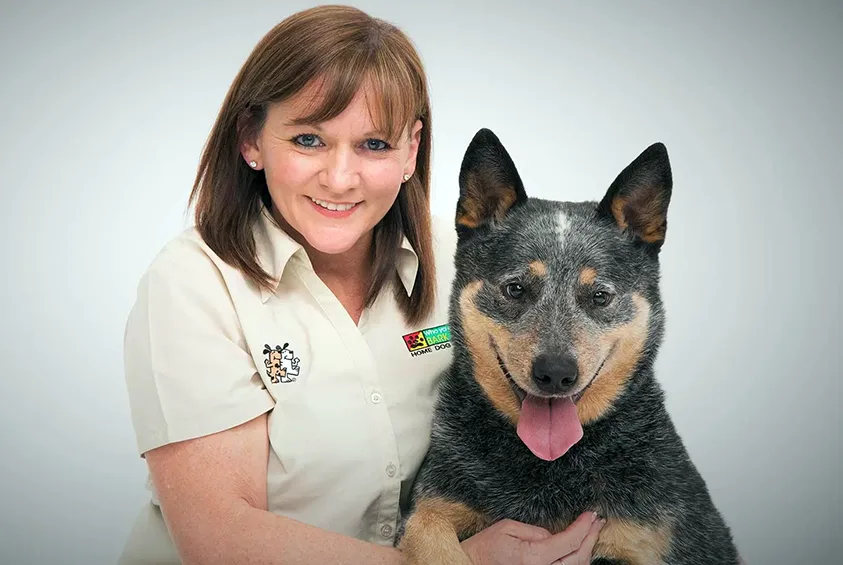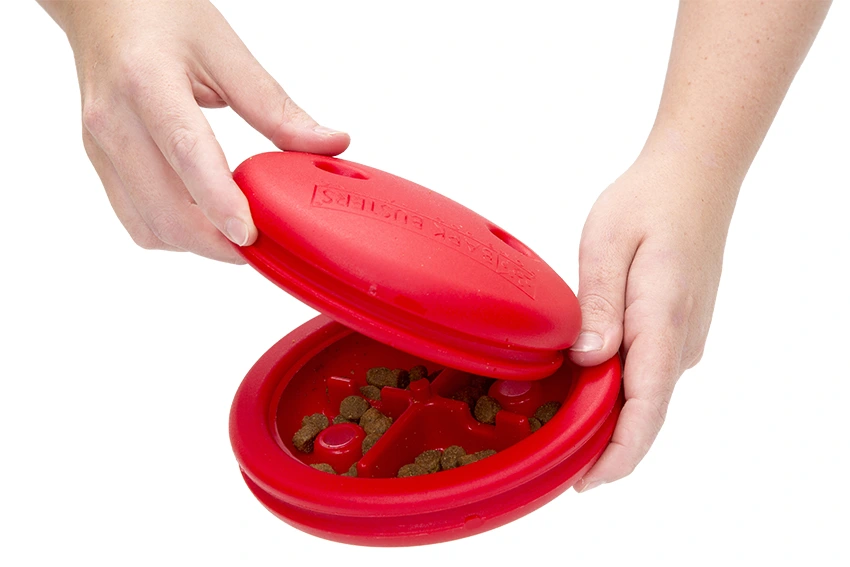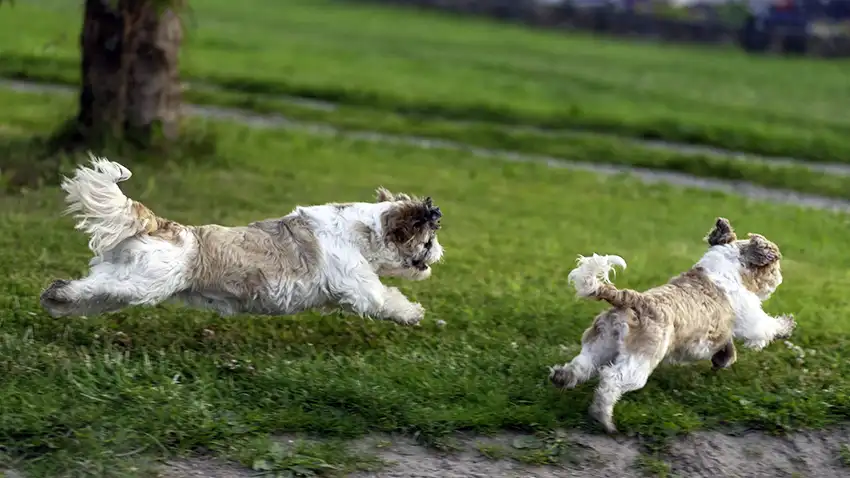The Shih Tzu, also known as the 'Chrysanthemum-Faced Dog', makes a wonderful family pet, or is just as content to be someone's lap dog, which is why it is one of the more popular small dog breeds.
History
The Shih Tzu, (pronounced SHEED-ZOO) is an old breed that originated in Tibet over 1,000 years ago. It is thought that Tibetans sent these dogs to the Chinese royal family as gifts which were then bred with Pugs creating the breed we know and love today.
The mandarin phrase "Shih Tzu" translates to "little Lion" and it was most probably given this name due to its association with a Tibetan Buddhist God of Wisdom, who, according to legend, travelled with a small lion dog who could change into a fully grow lion.
In the early 1900's the Shih Tzu was nearly wiped out, partly due to the death of the Dowager Empress Tzu Hsi, who supervised a breeding programme. After her death the breeding programme fell apart, and it became almost impossible to get a Shih Tzu. However, a couple of decades later and a revival programme was launched. All the Shih Tzu dogs alive today can be traced back to just 14 dogs, seven males and seven females, from the breeding programme.

Breed Traits
When Bark Busters get the call to train a Shih Tzu, it will be for one of several specific reasons, barking, aggression to their family, biting the groomer or playing a little too hard at the doggy-day-care centre.
Apart from the barking, which is inherent to the breed, most of the behaviour problems we are called upon to deal with, originate in bad experiences rather than breed traits.
In the world of small breeds, this is one of the cutest breeds and unlike the Yorkshire Terrier, is not usually looking for a fight. The Shih Tzu has a reputation for getting along with most dogs that it meets.

They make good lapdogs, and they love nothing better than snuggling with you. They will worm their way into your heart and will let you know what they want from you, and when, which usually means to just be curled up on your lap in front of the fire or TV.
They are not overly demanding, but their barking can be a big problem and needs to be addressed as quickly as possible or it will become instilled and drive you to distraction.
This breed will just want to be pampered or nestled on your lap. If you do not want a lap dog, this might not be the right breed for you.
Bark Busters trainers train many Shih Tzu's each year and our methods suit their sweet nature and friendly disposition.
Highly Intelligent Breed

The Shih Tzu is a highly intelligent breed, and they will know what you are about to do, possibly before you do. They are very trainable and love learning new things, but they can train their owners much quicker than their owners can train them.
Before you know it, they will lead you to the pantry for a treat and then back to the couch for a cuddle, then out the door for a walk, leaving you wondering whose idea it was.
They love their daily walks and will be much loved by everyone they meet.
They will easily fraternise with other dogs, providing they have not had a bad experience as a puppy.
Bad experiences stay with Shih Tzu's and any trauma they have incurred is carried around with them like baggage. They are not generally fighters, and they prefer to try avoidance over engaging the perceived threat.
Although small in stature, they can perform tasks as easily as breeds twice their size, like obedience and agility competitions. However, they don’t cope too well with the hot weather.
Despite their high level of intelligence, they do adapt to just lazing about and are happy to just be your companion and follow you around.
Management
This breed is easy to manage as they are small and generally obliging, but they need your attention and don’t like to be ignored.
If you have a Shih Tzu or are thinking of getting one, then make sure you have time to spend with them. They will want to be soaking up the love and sitting on your lap a lot, because they want the reassurance that you are there for them.
They are a great breed for older people and do well in small apartments.
The Shih Tzu are considered hypoallergenic because they do not shed. However, they will need regular grooming and clipping.
Most Shih Tzu parents have them clipped in the summer to help them cope with the heat.
Their dense coat means that they will need regular flea and tick treatments, so speak to your vet for more information about the appropriate treatment.
To provide good leadership, you will need to provide a comfortable "time-out place" if you need to go to work or out for the evening and to help prevent Separation Anxiety.
You will also need to ensure that your Shih Tzu has regular vet checks to ensure they stay healthy.
Personality and Temperament

The Shih Tzu is lovable, adorable, cuddly, and full of fun. They have a very stable temperament that adapts quite easily to change, different environments and circumstances.
This stability possibly stems from their breeding as a lap dog, a dog to be pampered, preened, and adored, unlike other toy breeds that were bred to catch and kill other animals.
They are capable of fitting into most households and family situations and are happy to just play with the kids or soak up the love.
Good breeding is important to ensure your dog has the right personality and temperament to suit yours. They can be hard to find in rescues and shelters because they are one of the first breeds to be adopted!
They are a very trusting breed and generally love everyone and with some training and communication, they will make a great companion and great family dog.
The right training for your Shih Tzu
You might experience some chewing when your Shih Tzu is a young puppy, but that will usually soon pass. They do love to play with soft chewy toys and squeaky toys. Chewing will not be your biggest challenge, but barking and refusal to come to you, might be.
You might also experience some guarding issues as they tend to protect what is theirs, or what they consider to be theirs.
All dogs, regardless of breed, need their education and some basic training. We know that your dog is like your child and the type of education you choose has to be the very best type of education for you and your dog.
Bark Busters tailors all training to your dog's personality and your needs.
You cannot just trust your dog's education to just any dog trainer. They need someone who understands the breed, their personality and how to get the best from them in a gentle and kind way.
Capabilities
Donna Ryan Bark Busters International Head Trainer
The Shih Tzu is one of my favourite breeds. Being the doggie parent of two large dogs, it is great when I have a toy breed to train, like a Shih Tzu.
They are a loving breed, want to please, and just want to be close to you, which works well for me as a trainer.
I have never found the Shih Tzu to be a pushy breed. They will stand back and allow the bigger dogs control, but then they give you that look that says, get me some loving and some lap time please and funnily enough you want to oblige.
I do counsel the parents of Shih Tzu’s on the risks involved in over-indulging them as they are so sweet that they tend to worm their way into your heart and can be spoiled.

Their coat needs regular attention and I do recommend daily brushing to keep their fur clear of any tangles. If left unattended for too long, they need expert attention from the groomer and some serious clipping to return their coat to its former glory. If you don’t like grooming or brushing regularly, you can keep your Shih Tzu clipped, but you will then need a coat for warmth during the winter months. However, clipping largely takes away the cuteness and cuddly factor of this breed.
This breed loves to cuddle up on your lap and be where everything happens but do practice some separation time or you can create problems with Separation Anxiety.
If you are consistent, you will have no problem training your Shih Tzu. They love to learn new things and if you are patient, you can get the best out of them. They are people pleasers!
Donna Ryan
Separation Anxiety
Case Study - Carly Hates to Be Left 'Home Alone'
Carly was rescued from a shelter, by Sarah and James, at the age of 6 months. They wanted a dog that would be a great family dog and good with kids as they planned to have children in the near future. Meanwhile, they wanted a dog that would be able to fit into their busy lifestyle.
Carly was a great dog, and she did fit right in, sleeping at the foot of their bed each night and sitting on their laps every chance she got. She was like their child, and they treated her just like their child, looking to give her everything her heart desired.
Sarah told us that Carly hated being left alone, sulking each time they left the house, but she soon settled and waited anxiously for their return.
She would then greet them wildly on their return, as if they had been gone for weeks. Their lives together were fun, and Carly was always just one step behind them, asleep on their lap or asleep in their bed. She was so loving, and they saw no reason not to give her everything she wanted.
Sarah noticed that things started to change when Carly was about 12 months of age. She started barking at them as they tried to leave, even nipping their ankles as they tried to push her back with their feet. Also, she would bark for hours after they left for work and soon the neighbours began complaining.
Sarah and James were confused as to why she had suddenly gone from being so good, to being so bad.
They spoke to some of their friends who told them that Carly may be suffering from separation anxiety and that they should contact Bark Busters.
This 12-month milestone in dogs usually coincides with reaching maturity. They hit that age of maturity, full grown, where they are now ready to work out where they fit in their family unit; their position in the household, if you like. What they decide depends on how we behave and what we tell them via our actions and our behaviour.
Carly had learned over time, through Sarah and James’s behaviour around her, that she was the 'queen bee' and the one calling the shots. How dare they leave her behind? This was why she was barking and biting them when they tried to leave her. She was telling them in dog language, that she was not pleased with their behaviour.
The reason she took so long to get to that point was due to her lack of maturity. Until 12 months, she was not ready to act to claim her place in the family until she reached maturity, and now she needed to hold that place.

Sarah and James had never educated or trained Carly and they had not displayed any leadership qualities with her, instead preferring to shower her with love and adoration and responding each time to her demands for attention. There was a vacant position as the head of the family and Carly was now applying for the job.
Sarah and James had also made another mistake of never separating from her when they were home. She slept in their bed, sat on their laps, and followed them from room to room, meaning the only time they left her alone was when they left for work.
This is one of the main causes of Separation Anxiety and Carly’s behaviour is consistent with dogs that suffer this behaviour problem. It's the result of a lack of education and leadership and a failure to practice separation while at home.
Bark Busters showed Sarah and James how to easily address these behaviour problems, through basic exercises that subtly changed the balance in a kind, gentle and effective way, and it worked. Dogs like Carly are happy to find their right place in the family once things are brought back to a proper balance.
Carly was not a bad dog. She was just confused, as her dog owners led her to believe that she was in charge. She never wanted them to leave her.
Footnote: All dogs are hardwired at birth to fill a particular place in the pack / family unit. If a position at the top exits, some dogs may try to fill that top position and exert control. It is up to dog owners to assume the leadership role.
Every dog needs to learn that it is okay to separate from its pet parents. This can be addressed by practicing separation while you are at home. Love alone is not enough to have a happy and well- balanced dog.
We all love our dogs, but we also want them to be happy when everyone is not together. They need to learn to cope with our absence.
Health
Everyday Illnesses and Injuries
Your Shih Tzu’s health concerns will change over the course of their life. A puppy might be more prone to ear infections, a 2-year-old Shih Tzu may be more likely to show signs of dental disease, and a senior Shih Tzu may be more likely to develop eye problems later in life. Shih Tzu’s also have personality and physical traits that may make them more prone to certain conditions. The adorable short snout of the Shih Tzu makes it sensitive to warm weather, prone to heat stress and breathing problems.
If you are ever concerned about your dog's health, your local veterinarian is a great resource, no matter how small the question.
Genetic Health Concerns
Like many popular breeds, the Shih Tzu has its fair share of hereditary based issues, like bone and joint problems. Most reputable breeders now have their breeding stock checked and scored for these hereditary ailments by a vet. You should request proof that the puppy you are purchasing comes from parents that have been checked for these issues.
Many other health issues are also hereditary, so do some research on the ancestry of your puppy and any health issues of the breed.
Many rescue organisations also check for common ailments before making them available for adoption.
Training

To train a Shih Tzu, you first need to establish your rules and boundaries and then ensure that all the family sticks to them. Consistency and routine are the key. Is your dog going to be allowed in your bed, or on your couch etc. Then, once you have agreed your 'rules list', set about making sure your dog knows what the rules and boundaries are, and be consistent.
Bark Busters believes that dogs are predisposed and hardwired at birth, to want to belong to a social group that has a strong leader at its core. It's what makes them feel secure, safe, and less anxious, knowing that their needs are going to be met. This is why dogs like to form strong bonds with humans and other animals. It’s in their DNA to want to be part of a strong social group / their pack.
A dog really needs that 'vacation feeling' and the feeling that it is always in vacation mode. You know that feeling you have when you are on vacation, you don’t have a care in the world, you are free from all your woes. When on vacation, you feel like you have left all your cares behind you, and now you can finally relax and enjoy yourself.
This is the way your dog should feel all the time. It's the best frame of mind for all dogs, because it means you are taking care of things for them, and you have their back.
Their mother has educated her puppies in the way of the dog. She is not teaching them the way of the human or how humans think and react, that will come from their new human family.
There are several different types of training methods available, such as treat training or clicker training as well as other types that use force. Bark Busters training employs 'communication'. We speak to dogs in a language they understand; a language they learned at birth. It’s 'dog language' and most dogs respond almost immediately. We 'train the brain' and look for signs that the dog understands what we are communicating. We look for cooperation and understanding and that your dog knows what we are asking it to do.
Show and Guide
At Bark Busters, we believe that there should be no force involved in training and that hands should only be used for praise. Your dog should never fear being touched by you, they need to know that your hands mean kindness, not pain.
We teach dog owners how to "show and guide" their dog to make better choices. There is never any need to use force.
The use of treats in training dogs has become very popular in the last 20 years and may seem like the only / right choice. However, many dogs either take the treat and ignore you or they don’t care about food, and don’t respond at all.
Either way, treats have their limitations, and treat training does not offer the complete answer for all dogs for all behaviour problems or training needs. Many dog owners are happy to hear that Bark Busters training does not rely on the use of treats as they are tired of carrying pockets full of treats to get their dog to comply with their wishes.
Bark Busters will use treats sparingly, if a case calls for it or if a dog’s personality calls for their use, but it’s not our main tool for training. We only use treats when required or when the need arises.
The main core of our training program is 'canine communication' through voice tone and body language. This allows the dog owner to gain fast results because this is a dog's first language. Speaking dog is learned from their mum and litter mates. We want your dog to love and respect you and not what treats you have in your pocket.
Human language is the dog's second language. They can learn to understand words of the human language, but it takes time and repetition.
Bark Busters' training explains how to communicate with your dog in their language, 'canine language'. As they can't speak human, we need to speak dog.
Our training is based on building trust, respect and forming a strong bond between a dog and human. By using voice tones and body language, you will have a well-trained dog in no time at all. Most pet parents see amazing results after the first lesson.
"Absolutely phenomenal! We have a very sassy dog called Charlie who had issues with boundaries and resource guarding. During our first lesson the improvements we saw were absolutely phenomenal. Charlie was picking it up really fast and it was done in such a positive way, which was really important to us. We're really excited to keep going on our Bark Busters journey!"
Customer review - October 2023 - Trainer - Kirsty Dudfield - Read Review
Recall - Come Back When Called

The 'Recall' issue is quite often a case where a dog finds that what it is currently doing is more interesting than returning to the owner. A dog may want to keep playing and does not want to return or it may be that it finds what it is currently sniffing is more interesting. It can also be a dog trying to initiate a game of chase with you.
It can also be that a dog may dislike going to their owner because their dog thinks it will be told off, or the owner grabbed them with their hands when they approached, or they immediately made them sit or spoke to them in a stern voice when they returned. This creates a miscommunication in the dog's mind that it will feel uncomfortable when it approaches the human, so they avoid that and stay away.
Many people think that their dog is being stubborn or cantankerous if they don't respond to commands. However, they are just practicing avoidance of something they possibly long since learned caused them discomfort.
If you want your dog to come to you when called, practice greeting them in a nice and gentle way, give them lots of praise and don't go straight to carrying out an action that was the reason you called them. Praise and pet them when they arrive, don't grab them, or immediately clip a lead to them. Instead, spend some time praising and greeting them. Also, let them wander off and repeat the recall exercise again, repeatedly bringing them to you.
Sometimes dog owners can send the wrong messages to their dogs by only calling them back by using their name. They demand that their dog return, using a stern voice and harsh commands, which can frighten the dog, or they might have previously tackled their dog out of frustration.
When practicing the 'recall' exercise, remember that your dog does not really understand your language, but it can interpret body language much better. Crouch and raise your voice a few octaves and make encouraging high-pitched sounds. Never use a stern voice and demand that your dog comes to you as that is not the way to win them over and to make them want to approach you.
If you want your dog to come to you when called, negative reinforcement will not work. Your dog must feel that it can approach you without fear or concern.
When calling your dog, it must first want to be with you, then it must want to stay with you. How you react when your dog approaches will depend on whether they want to stay and spend time.
It is very important to keep the invitation to approach appealing, in a high-pitched enticing voice, and remember to lower your height. Don’t forget to offer lots of praise when they are on their way and when they arrive. If you really want to use treats, you can then take them to the treat jar and treat them, but this must only be after they have been praised for coming when called.
Don’t grab your dog’s collar, or try to hang onto him, because this will cause your dog to try and avoid your hands.
Never chase your dog if it refuses to approach you. That will only cause your dog to run away and possibly hide, causing a bad association. It is better to move backwards and away, while lowering your height, or even lay down.
Barking
As we discussed earlier, the Shih Tzu does not have as many behaviour problems as other smaller breeds, but their barking can seem out of control.
The Shih Tzu is a yappy breed and prone to barking. They tend to bark at people and dogs passing the window, or off in the distance when walking. They love to bark at the front door when visitors arrive, as if saying please pet me.
Barking while travelling in the car can be a problem that is easily rectified. You could try adding a crate to your vehicle and popping your dog in their crate while you travel. To address barking, you must catch your dog in the act and let them know, via communication, that what they are doing is the wrong thing. Dogs can become over-stimulated in cars as the world goes zooming by.
We have great success with our training to stop inappropriate and unwarranted barking.
Puppy Selection
There are many places to acquire a puppy where you can be sure you are getting a puppy that has had the proper breeding. Check out your local rescues and shelters because they have some amazing dogs and puppies that are desperate for a forever home.
Check out the local Breed Specific Rescues, animal welfare shelters, RSPCA and Dogs Trust, as they have many great dogs looking for homes too, who through no fault of their own, have ended up being abandoned. These organisations test their dogs for temperament and soundness.
By adopting, you will be helping a dog in need, one that wants nothing more than to be in a loving home. There are too many companion animals euthanised each year and Bark Busters encourages you to visit one first before buying a puppy from a breeder.
When you are selecting a puppy, try to avoid selecting the fearful or over-zealous puppy. If you are at a shelter, consider that the dog might just be traumatised by their surroundings. All those barking dogs cause timid dogs stress and quite often you will see a different dog if you can get the staff to bring him away to a private viewing section for you. Animal Welfare and Rescues do amazing work in trying to save dogs and match breeds to the right owners, so consider that option when looking for a new puppy.
Select the right puppy. One that suits your lifestyle.
Many of our Bark Busters’ trainers volunteer their services at local shelters and rescues to assist in rehabilitating dogs. Bark Busters have saved many thousands of dogs through our volunteer rescue programmes around the world.
If you do decide to go to a breeder, then ensure you view both parents to determine the puppy’s personality and parentage.
View all interaction between the puppies as this will tell you a lot about their personality. Look out for those assertive types if you want a dog that is going to be good family dog that is good with children.
Tips for Bringing a New Puppy Home

Do not bring a puppy home before it has reached 8 weeks of age but preferably 12 weeks. Any earlier and they will miss out on much needed bonding with other puppies and their mother.
Bring your puppy home early in the day to allow time for your puppy to settle into its new home.
Try to bring some bedding home with the scent of the mother dog, scent of other litter mates, or a familiar scent.
Ensure that you know where your puppy will sleep and introduce your puppy to this area during mealtimes.
If you need to leave your puppy alone for a short while, ensure that you address any barking, while hidden close by, without returning to the puppy. Returning every time your puppy demands, will only encourage more barking. Puppies do better if they know you are there nearby and have not deserted them.
Ensure you have the same diet that your puppy was being fed when with its mother. Any diet change must be a gradual one.
Ensure that you puppy proof your house and place anything dangerous out of harm's way, such as electrical cables and poisonous chemicals.
Make sure you provide lots of bathroom breaks. Take your puppy to do its business at least 8 times per day, after sleeping, eating, drinking and any exuberant exercise.
Do I Want One Dog or Two?
We are often asked by prospective dog parents if they should get one or two puppies. We always answer the same way. Get two only if you really want two dogs!
Dogs are pack animals, and they love having company, but the selection of two dogs is something that must be carefully thought through.
Two neutered males can cohabit without too many issues if their doggie parents treat them equally and do not display any favouritism. Unequal treatment is usually behind most Sibling Rivalry cases.
A male and a female of equal energy can also cohabit. This can be the best match, providing that the female and male are equally matched in size. If they are differing sizes, its best that the male is the larger of the two. Make sure that the female is neutered, when appropriate, or problems could occur if a large male tries to mate with a smaller female.
Two females are not always the perfect pair, as females invariably want to rule the household. It won’t be long before they test each other, and some females won't back down. When you have two females in a household, they both might try to be the boss of each other, which can lead to fights.
Toilet Training
Without a doubt, toilet training a puppy has its challenges and can try your patience. You need to be observant and begin as soon as the puppy is home with you. Bark Busters will make sure the process is not stressful for you or your puppy.
When puppies are first born, they relieve themselves in their den, but their mother is there to clean them. Therefore, there is no scent of urine or faeces where the puppies eat, sleep and play. As they get slightly older, they learn to imitate the mother when she goes outside. This way the puppy becomes conditioned to never eliminate in their dens. If you are crate training, you will find that puppies will avoid toileting in their crate at all costs.
Knowing when your puppy is likely to relieve themselves by reading their body language is the key to success.
Have you ever taken a puppy outside for a walk only to find they relieve themselves as soon as they get back indoors? To avoid this, walk the puppy directly to the area you have designated the toileting area. Stand still and stay with the puppy, so they no longer show interest in you. Do not sit down as this will only encourage the puppy to jump on you and forget what they are there for. Praise when they perform. NEVER scold or rub their nose in any mistakes. This is cruel and will teach your puppy to move out of sight or wait until you are not watching.
Your puppy does not possess human logic but will begin to form good habits through structured routines. Positive reinforcement when they do the right thing in the right place is the best and quickest toilet training method.
Four Basic Needs
Let's examine those four basic needs and why your dog needs them to keep it healthy, balanced and content.
Food - diet / nutrition
We promote a diet that is grain free, low in carbohydrates and without any harmful e-numbers, colours and preservatives. Carbohydrates do add energy that the dog needs to burn off and can make an already hyperactive dog more active.
The right diet, grain free and filled with fruits, vegetables and raw meat will have advantages to how your dog will feel, look and act.
If you want to understand why grains can make a dog more energetic, you only need to think of racehorses and how their trainers give them grain to get highly energetic racehorses. Energy in, equals energy out.
Bark Busters dog trainers are not vets or dietitians, so we urge you to do your own research into the best diet for your dog. A diet that you will be comfortable with.
We do however have vast experience of how highly concentrated grain diets effect behaviour and can cause hyperactivity. This is very prominent in Japan, where most dogs are fed high levels of rice in their diet which can adversely affect concentration and focus.
Safety - through leadership and education
All dogs need strong leadership and to know where they fit into the family unit. If they know they have a leader that will make all the decisions, one who is fair and just, they will be happy and content.
On the other hand, if they have no structure in their life, they have inconsistency, and don’t know how things will be from one day to the next, then they will become stressed and may experience health ailments, skin and stomach issues and behaviour problems. Routine and respect must be established. With equal doses of love and structure your dog will feel safe and secure.
Shelter - a place to call their own
Dogs love nothing better than to curl up on the couch or in a place they can call their own, even when there is more than one dog. Most dogs are very sociable, and they will think nothing of all snuggling in together. Provide your dog with its own "den", a place where they can call home, and somewhere they can go to for a bit of peace and quiet. Just make sure their "den" is warm, easy to clean and maintain.
Entertainment - toys & games
A very important part of your dog's four basic needs is their need to have something to do. If we want to avoid our pets becoming bored and destructive, then they need a way to fill their day.
Dogs thrive with physical and mental exercise. Dogs are highly intelligent animals, and they need to keep their brains active as much as their bodies. Entertainment is an important part of their well-being and essential to your dog's overall mental health.
One great toy is the Bark Busters GameChanger® which helps to prevent boredom, stress, and separation anxiety. By filling it with small treats, your dog will have plenty of fun trying to get the treats to dispense.

Games to Play
We need be mindful of the games we choose to play with a Shih Tzu as we are dealing with a canine that can be easily influenced by what we are teaching it to do. For example, a game where you chase your dog is not a good game to play as this only encourages your dog to grab something and run, like your shoe, a precious item, or something breakable.
'Tug of War' is okay and playing ball is good, provided your dog is not the type that gets fixated on the ball and refuses to stop playing when requested. Hide and seek is a great game too. These are games where you hide things from your dog, such as food, toys or a ball and then encourage them to go find it. You can increase the degree of difficulty as your dog gets better at the game.
Hide and seek is a game best played where you have another family member or friend to help you. Start out where your dog sees you hide the toy, then repeat over and over, 'Find' or ‘Seek’. When your dog master this you can then move on to not letting your dog see where you have hidden the item.
Remember to give your dog praise when he finds it. These sorts of games are great entertainment and offer mind exercises for your dog that will tire them as quick as a walk. They are far better than those type of games that encourage your dog to become overexcited or possessive of its toys.
Child's Play
Shih Tzu's are great with kids, but don't allow the children to turn them into babies or little fur children, as they can become frustrated quite easily and will want to avoid the children.
We don't recommend letting the children pick the dog up as it could get hurt. A Shih Tzu is also not a doll whose hair need to be styled.
Never leave any dog alone with children regardless of the breed, size or personality.
Interactive Play
Bark Busters has the ultimate toy for all dogs that provides dogs with several options. The GameChanger® by Bark Busters is an interactive puzzle toy that delivers a treat. It's a chew toy, that they can carry around and take to their bed. They can't rip it apart like many other toys. It's a workout toy, that they flip over with their nose and scratch it with their paws. The GameChanger® comes in four vibrant colours and will give your dog lots of fun and mental stimulation.
Dog Parks

With today's dog owners having such busy lifestyles, more and more dog owners are turning to dog parks as a way of socialising and exercising their dogs. While this is great fun for most dogs and dog owners, not every dog will do well in this environment.
A breed like the Shih Tzu is a toy breed that needs to be socialised with dogs of similar size and energy levels or they could become fearful of other dogs, especially those larger than themselves, which could lead to 'dog aggression'.
Some high energy large breeds have little or no regard for little shy or reserved dogs and will think nothing about bowling them over and showing them who is boss of the doggie park.
If your dog doesn't enjoy this type of rough and tumble, or is traumatised by it, then you might have an issue the next time you try to visit the park.
The best way to prevent this behaviour is to see if there is an option at your dog park to match size, and possibly personality, away from the boisterous dogs. If that is not possible, try visiting the dog park in off peak hours and practice gaining focus from your dog before you allow them to run off and play.
Bark Busters Lifetime Support Guarantee
Bark Busters dog behaviour therapists and trainers have trained more than 1 Million dogs worldwide and are renowned authorities in addressing dog behaviour with all-natural, dog-friendly methods. The Bark Busters training is the only service of its kind to provide International dog training guaranteed lifetime support. With hundreds of trainers around the world, Bark Busters continues its mission to enhance the human/canine relationship and to reduce the possibility of maltreatment, abandonment and euthanasia. Contact your local Bark Busters dog trainer to see how they can help.
This article is the copyright of Bark Busters® and is intended for information purposes only. Dog owners should fully research any problems that they may have with their dogs.
